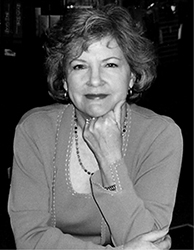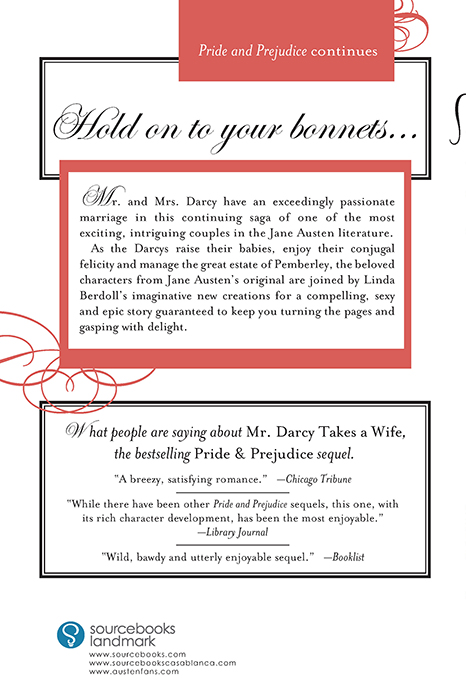Darcy & Elizabeth (66 page)
Authors: Linda Berdoll

Homeward
Once they were at last upon their way to Pemberley, Darcy closed the window-shade but was stopt before he could don his hat again.
“Do not,” said Elizabeth.
Without looking in her direction, he set it upon the opposing seat.
“If we must travel, I like this carriage especially,” she said settling herself against him.
He looked upon her with both tenderness and puzzlement, saying, “This one? It looks to have seen its day. I am astonished to know we still own it.”
She nodded her head, reminding him that it had been stored at their London house.
“We have newer, and if I do say so myself, finer carriages.”
“I like this one,” she explained. “I selected it particularly for our return home. It has a history.”
Several of their carriages had a history, for much had come to pass upon their travel to and from Pemberley. Of those most notable, Darcy could think of none that he would recollect with any fondness. The kidnapping was one journey that was the most abhorrent of all. He recalled that coach most particularly because of the cotter pin that had been disturbed, causing him to leave her and seek repair. This was not that coach. Another coach came to mind which was accompanied by a considerably less abhorrent recollection, but still inflicted an injurious memory. That had been the coach in which she had laboured and given birth. When he had arrived home that day past, he had seen it sitting near the portico. The interior had been stained with bloodâhe was beside himself with fear. The picture of the condition of those seats was imprinted in his brain as if branded. The first one he could never again bear to gaze upon and had it sold. The other had been reupholstered. The coach in which they rode had no history to him.
Seeing that he did not understand her meaning, she aided his memory.
“There was another journey,” she said, “of which I see you have no recollection. I am very much offended, for it has never quite left my thoughts lo these many years.”
His expression did a very good job of wanting to know of what she spoke, but ultimately he did not. As her words had not prompted him, she thought to illustrate. Meticulously, she lowered each shade. It was dark, but that did not matter, it was only an approximation, not an actual re-creation. He sat very still as she went about her demonstration, if he knew yet what she meant for him to recollect, he did not remark upon it.
“Upon the past occasion, it was you, sir, who lowered these shades.”
“Is that so?” he inquired mildly. “What then came to pass?”
It remained unclear if he had guessed that she was referring to her second journey to Pemberleyâthe first as his wife. That occasioned upon a bright winter day and this was an early autumn night, but she was not deterredâthe weather had been unimportant. What was pertinent occurred inside and the coach was as it had been then. There was one exception.
The early part of their journey had been unhappy for two reasons. Firstly, the road had been unduly rough due to heavy rains, straining the springs of the coach. This bouncing would have played havoc upon her nether-end even had she not been so sore due to her introduction to marital duties. He had offered her a pillow, and it was the most indiscreet cushion she had ever seenâof puce satin, tasselled all aroundâone she refused from mortification. The second reason for her displeasure had been his general demeanour, for he had been exceedingly distantâto the point of rudeness. Their wedding night had been for her one of rapturous blissâan enjoyment that she had not kept to herself. In the bright light of the morn, she feared that he had been off-put by her enthusiasm for physical congress the night before. But he was not. It was not her libido that had frightened him, but his own. He had not been the tender lover that he had intended.
Indeed, it had all been a misunderstanding.
The pillow was not for her mortification, but his.
It was not upon taking their vows that they had truly become as one. That had been man's unificationânot even the throes of passion they had enjoyed that night were sufficient. They had become truly joined together in the coach the next day. It was there that he had truly communed. He had lain open his heart and she had as well. They had become one heart of two parts. They had, of course, also enjoyed repeated unifications of an erotic nature which had made the memory all the sweeter. What was intimately passionate within the hush of darkness of their bedchamber had become unabashedly erotic in the rocking carriageâface to face, compleatly clothedâbut beneath, their sexes unitedâa secret shared. She could never think of it without a frisson deep within her feminine reaches.
That had not been a singular journey in that they had been intimate upon other occasions in the carriage, but never with quite such wild abandon. He could not have forgotten; whether he would want to recall it was another matter entirely.
To his inquiry, she said nothing more, content just then to bask in the recollection by herself. Neither wanted to speak of Wickham, Lydia, the girl Sally, or anything that had come lately to pass. It was a silent agreement. She laid her head against his shoulder and crossed her ankles upon the seat next to his hat.
Although she thought herself content to allow the matter to rest, her act of nonchalance was an announcement of another subject and she wriggled her feet as if to tempt him. She thought it an impotent attempt, certain his spirit had been sapped by what he had endured by meeting with Wickham. Still, she slipped off her slippers and wriggled her toes in her stocking feet. When no sound came from him, she looked to see if he had fallen asleep. When she did, he caught her face in his hand and raised her lips to kiss. That kiss began chastely but did not remain so. Indeed, hands were employed, limbs stroked, until at last escalation was inevitable.
It was a large coach, but for a man of long leg such as he, manoeuvrability was limited. (It had been some time since they had engaged themselves thusly inside their coachâtheir love was not old, their need just less often so immediate.) Hence, when strokings no longer fed their hunger, it took a moment for knees and elbows to relocate. Once he had drawn her upon his lap, her skirt billowed over them both, obscuring their union even from their own eyesâand made it difficult for his hand to find its way to the buttons on his breeches.
“Your gowns please me better when otherwise engaged,” he complained.
He became increasingly impatient to release himself, but she was wise enough in lovemaking by then to know that hindered eagreness would be rewarded to them both. Indeed, when at last he freed himself, his tumescence was one of particular glory. As it was hidden beneath the volume of her skirt, however, she was unable to admire it. But when he grasped her by the buttocks and drew her forcefully down upon him, she was made fully cognizant of the magnitude of his instrument. Indeed, such was his ardour that she could not stop herself from crying out. That was but a momentary pain, and as she was the one who was the initiator, she believed it unfair of her to complain (involuntarily or not) and stuffed one fist in her mouth lest she cry out again.
He was gentler then, but was in such heat that the last powerful thrusts of love were engaged upon the seat opposite. With the last convulsions of passion passed, he sat back, pulling her back upon him in their original positionâtheir bodies still engaged, but the mechanism fast waning. Her arms were still tightly about his neck, for the flutters had not entirely ceased within her. (It would be a while before she examined the ridges her teeth had made in her knuckles.)
“Pray, Lizzy,” he inquired, whispering in her ear, “did Iâ¦? Were you injured by my efforts?”
“No,” she said, “never.”
It was a point of pride to her never to admit that the generosity of his member had been injurious to her person. Had she given it thought, she might have understood that resolve to have been birthed upon their first night together. He
had
hurt her and he had been all but overcome with remorse. She did not want him ever to restrain himself on her behalf. Her pride demanded she gave as good as she gotâso to speak.
At her denial of any injury, he wrapped his arms about her, massaging her back in solace.
“I think you are too brave, my love,” he whispered. “You must tell me if I am not gentle enough.”
From the sound of the carriage wheels, they could tell that the cobbles of London were no longer beneath them. The rocking of the coach announced their speed had increased and they were fast on for Pemberley.
She drew back and looked at him with a half-smile and ran the back of her fingers across his chin, “You are gentle upon those occasions I want you so.”
“You mean, then, that you do not need this?”
He had in his hand a pillow. It was not the exact shade of the one she recalled, but it was red. Where it had been hidden, she had not a clue. But it was undeniably tasselled.
And not at all discreet.
It is Sourcebooks editor Deb Werksman who bears the distinction of single-handedly rescuing my first book,
The Bar Sinister,
from the bowels of self-publishing purgatory. Still, throwing one's work open for critique can be a harrowing experience. But Deb managed to hold my hand through it all, ensuring that I weathered the ordeal relatively unscathed. Not only did she polish my manuscript, but she astutely retrieved its original title. When
Mr. Darcy Takes a Wife
was published, it was to general applause (and only a few wails of outrage). To those who were delighted by it, I grant Deb a large portion of the credit. To the indignant fewâwell, I am happy to have her share the blame.
I was fortunate once again to have Deb's guidance for
Darcy & Elizabeth
. For her wise counsel, she has earned my undying gratitude. I would also like to thank her associates, Susie Benton, Elizabeth Meagher, and Stephanie Frerich, for their invaluable editorial contributions and Megan Dempster and Anne LoCascio for their exquisite work on the cover art.
Additional thanks to Lynne Robson, who graciously acted as our Derbyshire tour guide.

Linda Berdoll is the author of the number one bestselling Jane Austen sequelâher first novel,
Mr. Darcy Takes a Wife.
Linda Berdoll is a self-described “Texas farm wife” whose interest in all things Austen was piqued by the BBC/A&E miniseries of
Pride and Prejudice
. Four years and much research later,
Mr. Darcy Takes a Wife
(originally titled
The Bar Sinister
) appeared, to the acclaim of readers and the horror of Jane Austen purists. She and her husband live on a pecan farm in Del Valle, Texas. Although she admits that she eloped in a manner similar to Lydia Bennet's, to her great fortune it was with Darcy, not Wickham.

